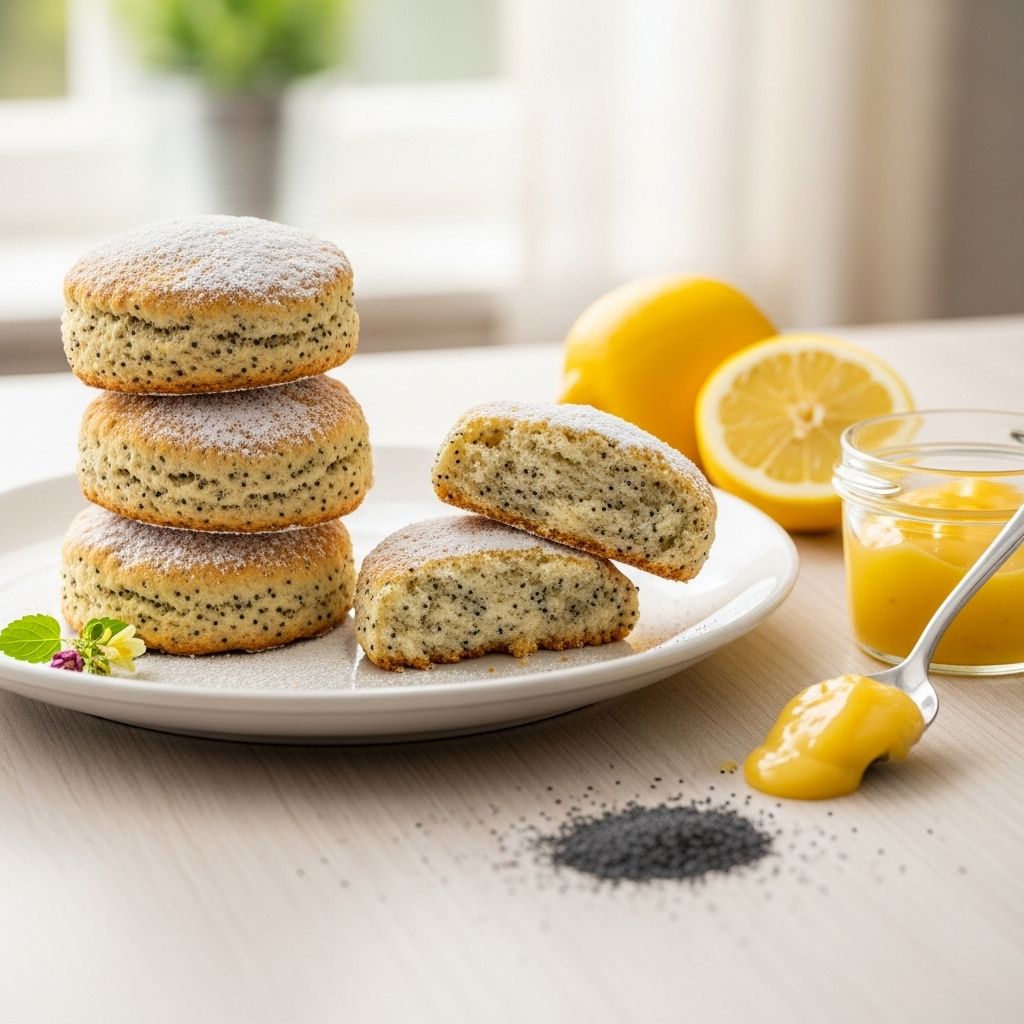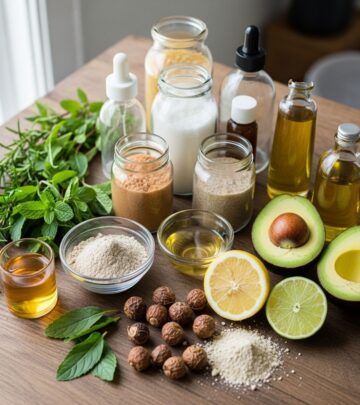Lemon Poppy Seed Scones: A Bright and Buttery Breakfast Classic
Bright citrus zest and gentle crunch blend into flaky scones you can bake with ease.

Lemon Poppy Seed Scones: A Sunshine-Infused Treat for Any Occasion
Few baked goods combine comfort and freshness quite like homemade lemon poppy seed scones. The burst of lemon zest and tangy flavor blended with the gentle crunch and nuttiness of poppy seeds make these scones a perennial favorite for breakfast tables, brunch spreads, and afternoon tea alike. Whether you’re a skilled baker or a kitchen beginner, this guide will walk you through everything you need to know to create moist, tender, and brightly flavored scones at home.
What Makes Lemon Poppy Seed Scones Special?
Scones are beloved for their buttery texture and versatility—you can find them packed with fruits, drizzled in glaze, or speckled with spices. The lemon-poppy seed combination delivers:
- Bright Citrus Zest: Fresh lemon rind infuses the dough with a sunny aroma and distinct tang.
- Subtle Nutty Crunch: Poppy seeds add a mild crunch and nutty undertone, balancing the citrus notes.
- Simple Preparation: With just a few steps and pantry ingredients, you can whip up a batch in about 30 minutes.
- Versatile Serving: Enjoy them on their own, topped with butter, or paired with clotted cream, preserves, or lemon curd.
Ingredients for Lemon Poppy Seed Scones
The beauty of classic scones lies in their simplicity. You’ll need staple baking ingredients plus fresh lemons and poppy seeds:
| Ingredient | Amount | Purpose |
|---|---|---|
| All-purpose flour | 2 cups | Provides structure and body to the scones. |
| Granulated sugar | 3 Tbsp. | Adds sweetness without overpowering the lemon. |
| Poppy seeds | 2 Tbsp. | Contributes crunch and mild nutty flavor. |
| Lemon zest | Zest of 2 large lemons | Infuses dough with fresh citrus aroma. |
| Baking powder | 1 Tbsp. | Ensures a high, tender rise. |
| Baking soda | 1/2 tsp. | Assists the rise and tenderness. |
| Salt | 1/2 tsp. | Highlights other flavors. |
| Unsalted butter (cold) | 8 Tbsp. (1 stick), cut into small pieces | Provides flaky texture and rich flavor. |
| Egg | 1 large | Binds ingredients, gives tenderness. |
| Whole milk or heavy cream | 1/2 cup | Moistens dough. |
Note: For extra lemon punch, swap milk for lemon juice or add a teaspoon of vanilla extract.
How to Make Lemon Poppy Seed Scones
Prepare to enjoy the irresistible aroma of freshly baked scones wafting through your kitchen. Follow these steps for bakery-worthy results:
- Preheat your oven to 400°F (200°C). Line a baking sheet with parchment paper.
- Combine the dry ingredients: In a large mixing bowl, whisk together the flour, sugar, poppy seeds, baking powder, baking soda, salt, and lemon zest.
- Cut in the butter: Add the cold, chopped butter to the flour mixture. Using a pastry cutter, two forks, or your fingertips, work the butter into the flour until you have a crumbly mixture with some pea-sized pieces remaining.
- Mix wet ingredients: In a separate bowl, whisk the egg and milk (or cream) together. Pour this mixture into the flour-butter mixture.
- Gently bring dough together: Using a wooden spoon or your hands, stir until just combined. Do not overmix—it’s okay if the dough looks a bit shaggy.
- Shape the dough: Turn out the dough onto a lightly floured surface. Pat and press it into a disc about 1 inch thick. With a sharp knife, cut into 8 wedges or use a round cutter for traditional shapes.
- Transfer and bake: Place the scones onto the prepared baking sheet. For a golden, crisp top, brush with a bit of milk or cream and sprinkle with a touch of granulated or sparkling sugar.
- Bake for 15–18 minutes, or until the tops are lightly golden and the edges firm. Cool for 5 minutes before serving.
Tip: For light and crumbly scones, keep all ingredients cold and handle the dough as little as possible. Overworking activates gluten and toughens the final product.
Lemon Glaze for Extra Zest (Optional)
If you love a little extra sweetness and tang, drizzle your scones with a simple lemon glaze:
- 1 cup powdered sugar
- 2–3 Tbsp. fresh lemon juice
- 1 tsp. finely grated lemon zest (optional)
Whisk together until smooth and pourable, then drizzle over cooled scones.
Serving Suggestions
Lemon poppy seed scones are delicious warm from the oven, but they can be enjoyed in many ways:
- With softened butter or whipped cream for breakfast.
- Alongside lemon curd or fruit preserves for afternoon tea.
- Paired with fresh berries for a spring brunch spread.
- As a portable snack or lunchbox treat.
For a special occasion, serve a platter of scones with an assortment of toppings so guests can customize their own.
Recipe Variations and Substitutions
- Meyer Lemons: Meyer lemons are sweeter and less tart than regular lemons, adding a floral note. Substitute in equal measure.
- Gluten-Free Flour: Use a high-quality all-purpose gluten-free blend for a celiac-friendly version.
- Dairy-Free: Try plant-based butter and non-dairy milk or coconut cream.
- Other Citrus: Replace lemon zest with orange or lime for a new flavor twist.
- Add-ins: Fold in blueberries, raspberries, or white chocolate chips for added interest.
Expert Tips for Perfect Scones
- Use cold butter: This creates little pockets of steam, yielding a flaky, tender crumb.
- Don’t over-mix: Stop mixing as soon as the dough comes together. Overworking creates tough scones.
- Pat, don’t roll: Use your hands to gently pat the dough into shape rather than rolling to avoid compressing the dough.
- Chill before baking: For sky-high scones, pop shaped dough in the freezer for 10–15 minutes before baking.
- Bake immediately: Delaying can affect rise and texture, especially if your environment is warm.
FAQs: Lemon Poppy Seed Scones
Q: Can I make these scones ahead of time?
A: Yes! Shape the dough and store it covered in the refrigerator overnight or freeze the unbaked scones. Bake straight from the freezer, adding a few extra minutes to the baking time.
Q: How do I store leftover scones?
A: Store cooled scones in an airtight container at room temperature for up to 2 days, or refrigerate for 1 week. Reheat in a low oven for best texture.
Q: Can I freeze baked scones?
A: Absolutely. Let them cool completely, then wrap individually and freeze for up to 2 months. Thaw overnight or reheat directly from frozen in a 300°F oven.
Q: Why are my scones dense?
A: Overmixing or using warm ingredients can make scones dense. Handle the dough gently and keep everything cold for a light texture.
Q: Do I have to use poppy seeds?
A: No—while they add a subtle nutty crunch, the recipe is still delicious without them. Try adding flaked almonds or skipping them for a classic lemon scone.
Pairings and Presentation Ideas
Add a special touch to your next brunch or tea party with these pairing ideas:
- Serve scones with a pot of Earl Grey or chamomile tea.
- Pair with fresh fruit, like mixed berries or a citrus salad, to double down on bright flavors.
- Offer homemade or store-bought lemon curd for guests to swirl onto their scones.
- For an elegant presentation, dust scones lightly with powdered sugar or drizzle with a lemon glaze.
Why Homemade Scones Are the Best
Making scones from scratch allows you to control the quality of the ingredients and tailor the flavor to your liking. Homemade scones:
- Are fresher and fluffier than most store-bought varieties.
- Let you experiment with flavors, fillings, and toppings.
- Can be baked in small batches—perfect when you need just a little treat.
- Make any breakfast or coffee break feel special.
Troubleshooting and Additional Baking Tips
- Sticky dough? Add a sprinkle of flour and gently knead just until manageable. Dough should be tacky but not wet.
- Scones spreading too much? Be sure your butter/dough is cold; chill before baking for clean edges.
- Not sweet enough? Increase sugar slightly or finish with a glaze for added sweetness.
- Scones not rising? Check the freshness of your baking powder and baking soda before starting.
Final Thoughts
From the lively perfume of lemon zest to the charming speckle of poppy seeds, these classic scones deliver simple pleasures in every bite. Whether you relish yours with a mug of tea or bring them as a brunch offering, their timeless appeal is as radiant as a bright spring morning. Follow the steps above, experiment with flavors, and soon these airy, golden scones may become a family tradition at your own table.
References
- https://teatimemagazine.com/lemon-poppy-seed-scones/
- https://www.peanutblossom.com/blog/lemon-scones/
- https://ourbestbites.com/lemon-poppy-seed-scones/
- https://www.countryliving.com/food-drinks/recipes/a3641/lemon-poppy-seed-scones-recipe-clv0511/
- https://coffeeclub.blog/recipes/lemon-poppy-seed-scones/
- https://littleindiana.com/2012/10/best-scones-recipes-lemon-poppyseed-scones/
Read full bio of medha deb












